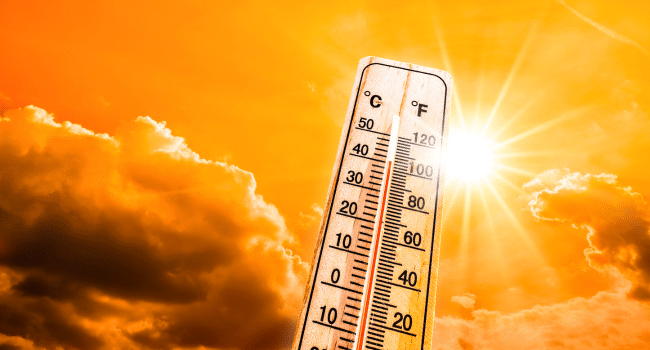Table of Contents
A heatwave is a prolonged period of excessively hot weather, often accompanied by high humidity. India experiences intense heatwaves, particularly between march and June. According to the India Meteorological Department (IMD), temperatures can rise above 40°C (104°F) in many regions, causing serious health concerns.
Health risks of heatwaves
Heatwaves can cause a range of health issues, including:
- Heat exhaustion: symptoms include heavy sweating, weakness, dizziness, nausea, and muscle cramps.
- Heat stroke: a life-threatening condition where the body temperature rises above 40°C (104°F), leading to confusion, unconsciousness or even death.
- Dehydration: prolonged exposure to extreme heat can lead to fluid loss, affecting normal body functions.
- Skin disorders: heat rashes, sunburns and other skin conditions may develop due to excessive sun exposure.
- Respiratory problems: high temperatures combined with air pollution can worsen breathing conditions like asthma.
- Electrolyte imbalance: excessive sweating can deplete essential minerals like sodium and potassium, leading to muscle cramps and fatigue.
How to protect yourself from heatwaves?
Stay safe during extreme heat with these essential tips to protect yourself from heatwaves.
- Stay hydrated
Drinking plenty of water is the best way to avoid dehydration during a heatwave.
- Drink at least 2-3 litres of water daily.
- Avoid alcohol, caffeine and sugary drinks, as they can dehydrate you.
- Consume fruits with high water content, such as watermelon, cucumbers and oranges.
- Add Oral Rehydration Solutions (ORS) or electrolyte drinks if you are sweating excessively.
- Wear light and comfortable clothing
Your choice of clothing can impact how well your body handles the heat.
- Wear light-coloured, loose-fitting and breathable cotton clothing.
- Avoid synthetic fabrics that trap heat.
- Use sunglasses and a wide-brimmed hat to protect yourself from direct sun exposure.
- Carry an umbrella for additional sun protection.
- Stay indoors during peak heat hours
The hottest part of the day is usually between 12 pm and 4 pm.
- Plan outdoor activities in the early morning or late evening.
- If you must step outside, take frequent breaks in shaded or air-conditioned areas.
- Keep your home cool by closing curtains, using fans and turning on air conditioning.
- Wet curtains and cross-ventilation can help maintain indoor cooling.
- Use cooling techniques
Simple tricks can help lower your body temperature.
- Take cold showers or sponge baths.
- Apply a damp cloth to pulse points like wrists, neck and ankles.
- Use a wet towel to cool your body when resting.
- Place ice packs on key cooling spots like the back of your neck and under your knees.
- Eat light and nutritious meals
Heavy meals can increase body heat.
- Opt for fresh vegetables, salads and fruits.
- Avoid oily and spicy foods that can raise body temperature.
- Eat small meals throughout the day instead of heavy portions.
- Include curd, buttermilk and coconut water in your diet for natural cooling.
- Protect yourself from sunburn
Sunburn can worsen dehydration and heat-related illnesses.
- Apply a broad-spectrum sunscreen (SPF 30 or higher) before stepping out.
- Reapply sunscreen every two hours, especially if sweating excessively.
- Seek shade whenever possible.
- Wear full-sleeved clothes for better sun protection.
Special care for vulnerable groups
Certain groups are more vulnerable to heatwaves and require extra precautions:
- Elderly and children
- Ensure they stay hydrated and avoid direct sunlight.
- Keep their living spaces well-ventilated.
- Dress them in loose, light clothing.
- Monitor them for any signs of heat exhaustion or heatstroke.
- Outdoor workers
- Take frequent water breaks.
- Wear protective headgear and light clothing.
- Work in shaded areas whenever possible.
- Use damp towels around the neck for cooling.
- People with pre-existing health conditions
- Those with heart disease, diabetes, or respiratory problems should avoid excessive heat exposure.
- Keep emergency contact numbers handy in case of health complications.
- Monitor blood pressure and sugar levels regularly during heatwaves.
What to do if someone suffers from heatstroke?
If you suspect someone is experiencing heatstroke:
- Move them to a cool, shaded area.
- Remove excess clothing and apply cool water to their skin.
- Fan them or apply ice packs to their armpits, neck and groin.
- Call for emergency medical assistance immediately.
- Offer small sips of water if the person is conscious.
The importance of health insurance during heatwaves
Heatwaves can cause health emergencies, leading to hospitalisation and hefty medical bills. Having a comprehensive health insurance policy can cover medical expenses related to heatstroke and dehydration. Some insurers offer wellness and health insurance apps, which you can use to check your key health vitals and manage insurance policies.
Conclusion
Heatwaves are becoming more frequent and severe due to climate change. While staying hydrated, wearing light clothing and avoiding the sun are essential, it is equally important to have a health insurance policy to safeguard against unexpected medical expenses. Stay safe, stay cool!
